Rock in a hard place: France-Spain border residents angry over road blocks
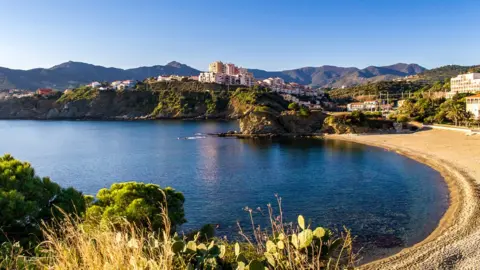 Google
GoogleUp the French coast from the Spanish border, tourists were enjoying a warm autumn day, basking in the Mediterranean and hiking along the arduous coastal paths.
But behind the idyllic appearances, local feelings have been running high. Two years ago, with little warning, the French government closed four small roads linking this area with its southern neighbour, Spain.
France says the aim of the closures is to stop illegal immigration. It has linked the move to anti-terrorism controls.
But Banyuls-sur-Mer's 6,000 residents have for decades shared numerous economic, cultural and personal ties with the population on the other side of the border in Spain. Posters all across the town now call for the re-opening of the border.
Of the four roads that were shut, the Col de Banyuls has almost mythical status here.
Tens of thousands of Spaniards fled along this route to France during the Spanish Civil War in the 1930s, while many allied forces and Jews escaped in the other direction during the Nazi occupation.
A pressure group of more than 1,000 people has held rallies along the border and gone to court to try and re-open the road. They call themselves "Alberes without borders", after this part of the Pyrenees mountain range.
"Most of the families in Banyuls - my own family, every family - have at different times in history had relatives on one side and part of the family on the other side," said the man behind the group, retired lawyer Pierre Becque.
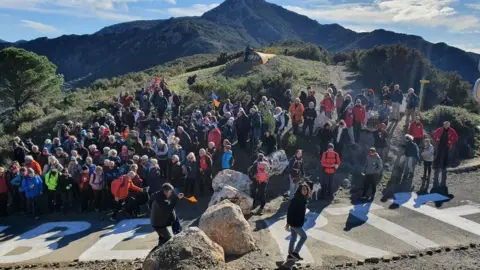
Driving up the Col de Banyuls, past vineyards, scrubland and cactuses, he says for people like him there is no border: "In the recent past we would all meet up at various times. Some came to flee Franco, or for work, or better education, or for personal reasons."
You know you've reached the border because massive boulders have been placed in the middle of the road to stop cars going through.
However, one of the rocks appears to have been nudged to the side to allow small vehicles through. Pierre Becque winked as he suggested that strong local winds must have pushed it.
Cyclists from Switzerland and the UK passed through the boulders oblivious they had broken any law. Two British tourists on mountain bikes, Lisa and Patrick, said there were no signs to turn back and Google Maps told them the road was still open.
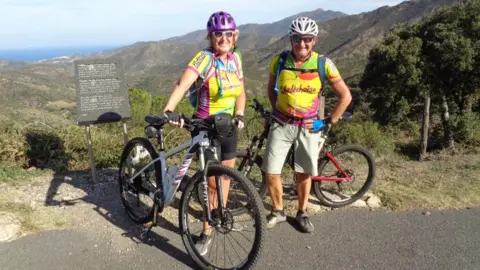
A French government spokeswoman told the BBC that the purpose behind closing the smaller routes was to allow police to focus on the main roads and rail links between the two countries.
She said there had been an 82% jump in illegal migration along this part of the border in 2022, and that the roads could be re-opened when joint French-Spanish police units were up and running.
However, that appears to be a low priority for now, with France once again on its highest state of terror alert - "Emergency Attack" - after a French schoolteacher was fatally stabbed in the northern city of Arras.
The mayor of Banyuls, Jean-Michel Sole, spends a lot of time with his Spanish counterparts trying to persuade the French government to re-open the border. He believes the arguments for closing the roads make no sense, even with France on maximum terror alert.
"We all want to feel safe… but I find it hard to believe any terrorist would take a steep remote road to attack who knows who," he explained.
"And immigrants cross on foot, not by car, so a few rocks are not going to stop anyone."
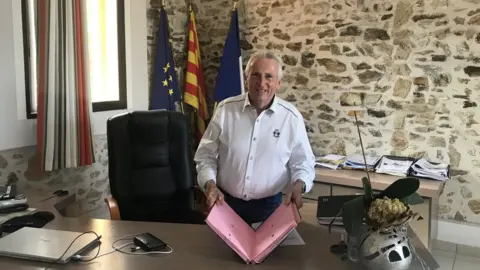
The border closures are also having an effect on the region's important wine industry.
More than 120 wine-producers bring their grapes to the biggest co-operative here, L'Etoile. And in the past hundreds of grape-pickers would cross the border for seasonal work.
What would have been a 15km (9 mile) trip has now become 80km, says Jean-Pierre Centene, the head of the co-operative.
"For our Spanish workers it now takes too much time and is too expensive for them so our work ties have been cut.
"This year grapes withered on the vines because there weren't enough pickers."
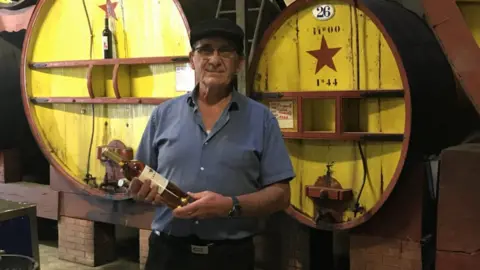
On the Spanish side of the border in the sleepy Catalan village of Espolla, a huge rock taken from the closed border has been placed on display in the main roundabout.
Farmer and local councillor Josep Maria Tegido has also been campaigning against the closed border, arguing that the road has been used for centuries to cross to the other side of the mountain, although he has never seen irregular migrants using it.
"The closure of the road represents a real impediment to traditional, cultural and economic activities from continuing."
Chris Bockman is the author of Are you the foie gras correspondent? Another slow news day in south-west France.

Sign up for our morning newsletter and get BBC News in your inbox.

